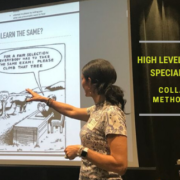Procrastination: Why We Do It and How to Combat It

Procrastination is an all too familiar practice for many of us. While certain people are more likely to put off all tasks until later, we have all experienced the desire to push off occasional duties, errands, chores, or responsibilities. For students, no matter their age or academic aptitude, procrastinating can become an alluring yet problematic habit. Pushing off tasks can become a major pitfall for several different reasons, but there are methods to combat this bad habit—and they begin with awareness.
The problem
Consistently, procrastination creates a snowball effect, in which anxiety or stress further compounds the need for the task avoidance. In basic terms, the more a student puts off a task or assignment, the greater the stress of the impending due date or need for completion. We all know this and can relate to that instinct—we then put it off even further because it has become such a monster that we must avoid it or ignore it at all costs.
The other issue surrounding procrastination is that we often procrastinate with the tasks or responsibilities that matter most or have the highest stakes. Whether we do this out of fear, denial, indifference, or laziness, the end result is typically the same: we experience a sort of self-destruction by missing an important deadline, or we cave in and begrudgingly and reluctantly complete the task in hurry. Either outcome is less than ideal, especially when grades are involved. Because of procrastination, students dig themselves into a hole, lose motivation, and therefore put forth even less effort with their school work.
The solutions
Awareness is key to combating the instinct to put off undesirable tasks. Once students realize how they procrastinate, they can begin to alter those behaviors. For example, a student completing research for a paper will find ways to distract himself from the assignment while working. They may check social media, text friends, pause to watch a show, listen to music, or simply scroll through random websites—anything becomes more enticing than the actual research.
Instead:
- Encourage students to limit distractions by keeping the phone off–limits during work sessions.
- Complete work in an area away from television, music, friends, and other distractions.
- Set a timer for 20-30 minutes of solid, uninterrupted work time. Then allow yourself to take a 3-5 minute break, but then get right back to work.
- Keep light snacks and water at hand while working to stave off hunger and the unnecessary urge to graze to avoid the assignment.
- Construct a checklist for a multi-step task and prioritize the tasks in order of difficulty. As students work, they should monitor the checklist and stick to the order of steps as necessary. Again, the urge to complete the easiest or most interesting steps is another procrastination tactic—instead, encourage students to tackle the challenging steps first. This will boost motivation and confidence while working.
- Organize to-do lists with tasks requiring the most time or focus at the top. These are typically the first things that students will avoid completing.
- Ask students to write down three things that they have accomplished at the end of a work session. The successes, no matter how small, show students that a strong work ethic and focus does help them to chip away at a daunting task that they may have vehemently avoided in the past.








